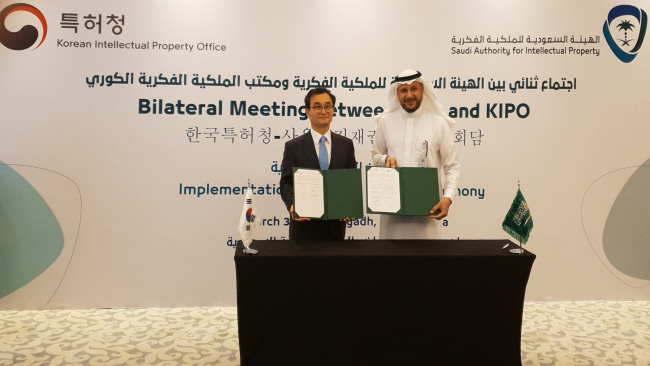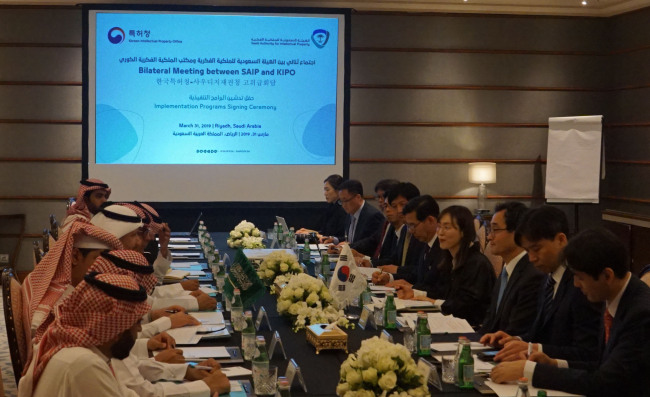[Herald Interview] Korea aims to go global with IP system
Equipped with comprehensive IP portfolio, KIPO chief pledges to expand scope of IP exports to ASEAN, India and Brazil
By Jung Min-kyungPublished : April 24, 2019 - 16:18
South Korea recently signed a memorandum of understanding worth $3.2 million with Saudi Arabia to help establish an ecosystem for intellectual property.
It was an outcome of efforts by Asia’s fourth-largest economy in expanding global partnership to share its intellectual property system, according to the chief of the nation’s top IP office.
“The deals with the United Arab Emirates and Saudi Arabia will work as a prime opportunity to promote our IP administration service to the world,” Korean Intellectual Property Office Commissioner Park Won-joo said in an interview with The Korea Herald.
It was an outcome of efforts by Asia’s fourth-largest economy in expanding global partnership to share its intellectual property system, according to the chief of the nation’s top IP office.
“The deals with the United Arab Emirates and Saudi Arabia will work as a prime opportunity to promote our IP administration service to the world,” Korean Intellectual Property Office Commissioner Park Won-joo said in an interview with The Korea Herald.

Korea has built a successful relationship with the UAE on IP cooperation since 2014, and this has provided a platform for the latest partnership with Saudi Arabia, according to Park.
“We plan to expand the scope of our global IP export to countries such as those in ASEAN, India, and Brazil, where Korean businesses have been actively entering markets, based on the successful deals we have made with the Middle Eastern nations,” he added.
Global expansion of the Korean IP system will not only help spread a Korea-friendly ecosystem, but accelerate local businesses’ entry into foreign markets while protecting their IPs in the respective nations, said Park.
The IP Office chief also expressed anticipation that ongoing partnerships with the Middle Eastern nations will help create a standard rulebook that could enable customized services for potential global partners.
“We expect to be able to deliver customized service to potential partners that seek to learn from our experience, through the standardization process,” Park said.
To aid Saudi Arabia’s Vision 2030, Korea signed a memorandum on March 31 with the Middle Eastern nation for the establishment of a healthy IP ecosystem. This is expected to help Saudi Arabia reduce its reliance on oil and diversify its economy.
The memorandum centers on a program that will allow the dispatch of 15 Korean IP experts, Saudi Arabia and Saudi patent examiners to participate in a training session here.
After the exchange, the two nations plan to cooperate in mapping out a strategy on intellectual property and developing an administrative information system for patent management. They also plan to carry out IP consulting for small and medium-sized firms in Saudi Arabia.
Park noted that though the two economies have focused on the resources and construction sectors so far in their exchanges, this will provide an opportunity to take a step further and bring joint achievements in the field of intellectual property.

Citing the IP partnership with the UAE -- which played a key role in the recent deal with Saudi Arabia -- Park highlighted the importance of creating a virtuous cycle in cooperation with global partners.
“We heard that a Saudi team visited the UAE and affirmed the progress of its IP cooperation with Korea in the process of selecting us as its partner,” Park said.
According to Park, through the export of the patent administration system to the UAE and by providing outsourced services for patent examination, the value of Korea’s IP exchange with the Emirates amounts to $14 million at the moment.
In 2016, Korea signed a follow-up deal worth $4.5 million with the Emirates and a new maintenance agreement in December last year.
The scope and duration of its partnership with the UAE has been expanding due to successful progress in the deal, Park said.
“As the successful precedent with the UAE set off positive momentum in our cooperation with Saudi Arabia, it is vital that we successfully carry out our deal with Saudi,” he said.
Korean IP system
Park said Korea is among a few nations -- alongside China and Japan -- that have managed to establish a nationwide strategy and develop solid infrastructure for IP.
“Local experts with experience in IP policy and administration are Korea’s foremost assets in the global competition,” Park said.
“We boast a diverse pool of experts since we deal with an all-round IP process. It’s not only screening and evaluating, but also production, protection, and implementation, which are crucial parts of policymaking,” he added.
Park said KIPO’s comprehensive portfolio helps the creation of a full IP ecosystem.
“South Korea is the fourth largest in the world in terms of patent application, and it is a member of IP5 alongside the US, Japan, European nations and China, leading the global development of the IP policy,” Park said.
The IP office chief noted upcoming events, such as the annual meeting of IP5 nations in June and the scheduled meeting between the heads of Korea-ASEAN IP offices in November, will serve as key platforms that will solidify IP exchanges among global nations. Both events are to be held in South Korea.
“We are planning to adopt a joint statement on Korea-ASEAN IP cooperation (at the November event), which will include a vision for cooperation and a specific plan,” Park said.
“And this year’s IP5 meeting will bring conclusion to subjects that have been main focus for the past year -- synchronization of administrative work and process, progress in ‘work sharing,’ adopting timeliness to the examination process and a smoother approach toward patent data and information,” he added.
Korea’s IP headquarters was established in 1949 as an external bureau of the then-Ministry of Commerce and Industry, under the name of the Patent Bureau. It was renamed KIPO in 1977.
By Jung Min-kyung and Lee Kwon-hyoung (mkjung@heraldcorp.com) (kwonhl@heraldcorp.com)

















![[KH Explains] Hyundai's full hybrid edge to pay off amid slow transition to pure EVs](http://res.heraldm.com/phpwas/restmb_idxmake.php?idx=652&simg=/content/image/2024/04/18/20240418050645_0.jpg&u=20240418181020)

![[Today’s K-pop] Zico drops snippet of collaboration with Jennie](http://res.heraldm.com/phpwas/restmb_idxmake.php?idx=642&simg=/content/image/2024/04/18/20240418050702_0.jpg&u=)